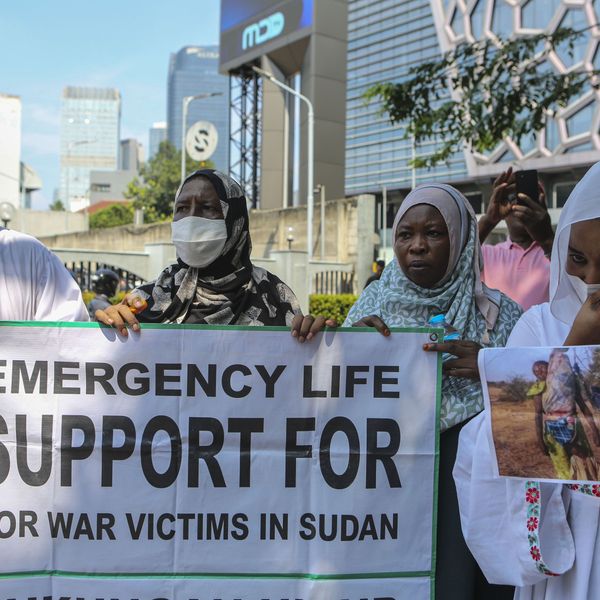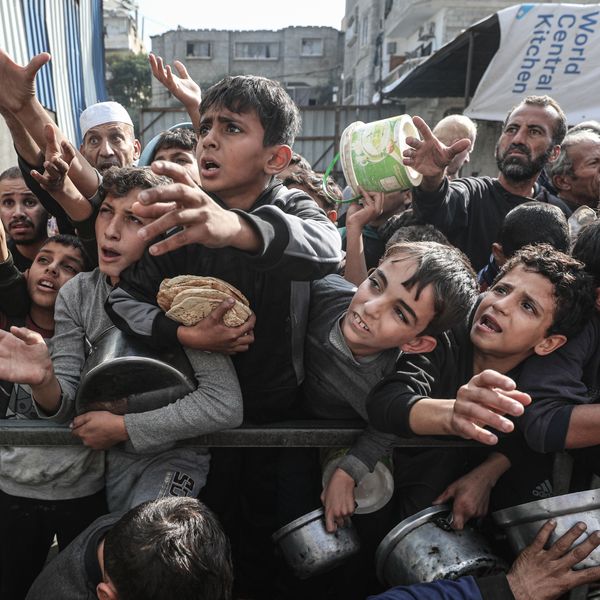Iraq's Little-Known Humanitarian Crisis
It is said that Iraq is the world's best-known conflict but the least well-known humanitarian crisis.
In the United States, where public attention span is low but the capacity for denial high, Iraq's daily carnage no longer commands headlines. American public discourse long ago shifted to the domestic political implications of Iraq for George W. Bush et al.
Those who do think of Iraq think mostly of the murderous sectarianism of the Sunnis and Shiites. If Muslims are killing each other, there's not much America can do, Iraq being another Yugoslavia - once the iron grip of Saddam Hussein or Josip Tito was gone, all the old animosities re-emerged.
But in Iraq, there was no such suppressed hatred. Shiites and Sunnis had always lived in harmony. Inter-marriage was common. The bombed-out Shiite shrine in Samara was in a Sunni neighbourhood.
The more apt parallel is with the 1947 partition of British India that precipitated a mass migration and a massacre among Hindus, Muslims and Sikhs who had lived in harmony for centuries.
When the state abrogates its most basic role of maintaining social order, anti-social forces and criminals can send scared people into a frenzy of primitive behaviour.
What's happening in Iraq is the direct result of American war-mongering and criminal incompetence.
Since the 2003 U.S. invasion, between 75,000 and 1.2 million Iraqis have been killed (depending on who's counting). This is in addition to the 1 million Iraqis, half of them children under 5, who died slow deaths during the 1991-2003 U.S.-led United Nations economic sanctions (a UNESCO estimate).
More than 4 million Iraqis have been displaced. Half have fled to Syria, Jordan, Egypt and elsewhere.
This is the largest forced migration of people in the Middle East since 1948, according to UNHCR, the United Nations refugee agency.
Nearly 8 million Iraqis - one in three - are in need of humanitarian aid.
Nearly half the internally displaced people do not have access to the Public Distribution System of ration cards and permits.
Only a third of Iraqis can access safe drinking water. The health system is collapsing. The drug distribution system has broken down. The sewage system has collapsed and only a fifth of Iraqis have access to a functional sanitary system.
Three-fourths of the internally displaced are either women (28 per cent) or children (48 per cent).
"Ninety per cent of those who die violent deaths are men, leaving huge numbers of widows and orphans without support," according to a special Iraq edition of Forced Migration Review, a publication of the Refugee Studies Centre of the University of Oxford (fmreview.org/Iraq).
"In the short term, there appears to be no way to address the protection vacuum in much of Iraq. Multinational Force Iraq and the Iraqi Security Forces are incapable of protecting civilians."
Prostitution is on the rise. "Young girls are increasingly obliged to contribute to family incomes. Consequently, the incidence of sexual and gender-based violence is on the rise," say Jose Riera and Andrew Harper, of UNHCR (unhcr.org/iraq). "Child labour and other means of exploitation are increasingly reported."
UNICEF estimates that 4.5 million children are under-nourished. One child in 10 is under-weight. One in five is short for their age. In some areas, up to 90 per cent of children are not in school.
This is one reality show you won't see on your television.
Haroon Siddiqui, the Star's editorial page editor emeritus, appears Thursday and Sunday. Email: hsiddiq@thestar.ca
(c) CopyrightToronto Star 1996-2007
An Urgent Message From Our Co-Founder
Dear Common Dreams reader, The U.S. is on a fast track to authoritarianism like nothing I've ever seen. Meanwhile, corporate news outlets are utterly capitulating to Trump, twisting their coverage to avoid drawing his ire while lining up to stuff cash in his pockets. That's why I believe that Common Dreams is doing the best and most consequential reporting that we've ever done. Our small but mighty team is a progressive reporting powerhouse, covering the news every day that the corporate media never will. Our mission has always been simple: To inform. To inspire. And to ignite change for the common good. Now here's the key piece that I want all our readers to understand: None of this would be possible without your financial support. That's not just some fundraising cliche. It's the absolute and literal truth. We don't accept corporate advertising and never will. We don't have a paywall because we don't think people should be blocked from critical news based on their ability to pay. Everything we do is funded by the donations of readers like you. Will you donate now to help power the nonprofit, independent reporting of Common Dreams? Thank you for being a vital member of our community. Together, we can keep independent journalism alive when it’s needed most. - Craig Brown, Co-founder |
It is said that Iraq is the world's best-known conflict but the least well-known humanitarian crisis.
In the United States, where public attention span is low but the capacity for denial high, Iraq's daily carnage no longer commands headlines. American public discourse long ago shifted to the domestic political implications of Iraq for George W. Bush et al.
Those who do think of Iraq think mostly of the murderous sectarianism of the Sunnis and Shiites. If Muslims are killing each other, there's not much America can do, Iraq being another Yugoslavia - once the iron grip of Saddam Hussein or Josip Tito was gone, all the old animosities re-emerged.
But in Iraq, there was no such suppressed hatred. Shiites and Sunnis had always lived in harmony. Inter-marriage was common. The bombed-out Shiite shrine in Samara was in a Sunni neighbourhood.
The more apt parallel is with the 1947 partition of British India that precipitated a mass migration and a massacre among Hindus, Muslims and Sikhs who had lived in harmony for centuries.
When the state abrogates its most basic role of maintaining social order, anti-social forces and criminals can send scared people into a frenzy of primitive behaviour.
What's happening in Iraq is the direct result of American war-mongering and criminal incompetence.
Since the 2003 U.S. invasion, between 75,000 and 1.2 million Iraqis have been killed (depending on who's counting). This is in addition to the 1 million Iraqis, half of them children under 5, who died slow deaths during the 1991-2003 U.S.-led United Nations economic sanctions (a UNESCO estimate).
More than 4 million Iraqis have been displaced. Half have fled to Syria, Jordan, Egypt and elsewhere.
This is the largest forced migration of people in the Middle East since 1948, according to UNHCR, the United Nations refugee agency.
Nearly 8 million Iraqis - one in three - are in need of humanitarian aid.
Nearly half the internally displaced people do not have access to the Public Distribution System of ration cards and permits.
Only a third of Iraqis can access safe drinking water. The health system is collapsing. The drug distribution system has broken down. The sewage system has collapsed and only a fifth of Iraqis have access to a functional sanitary system.
Three-fourths of the internally displaced are either women (28 per cent) or children (48 per cent).
"Ninety per cent of those who die violent deaths are men, leaving huge numbers of widows and orphans without support," according to a special Iraq edition of Forced Migration Review, a publication of the Refugee Studies Centre of the University of Oxford (fmreview.org/Iraq).
"In the short term, there appears to be no way to address the protection vacuum in much of Iraq. Multinational Force Iraq and the Iraqi Security Forces are incapable of protecting civilians."
Prostitution is on the rise. "Young girls are increasingly obliged to contribute to family incomes. Consequently, the incidence of sexual and gender-based violence is on the rise," say Jose Riera and Andrew Harper, of UNHCR (unhcr.org/iraq). "Child labour and other means of exploitation are increasingly reported."
UNICEF estimates that 4.5 million children are under-nourished. One child in 10 is under-weight. One in five is short for their age. In some areas, up to 90 per cent of children are not in school.
This is one reality show you won't see on your television.
Haroon Siddiqui, the Star's editorial page editor emeritus, appears Thursday and Sunday. Email: hsiddiq@thestar.ca
(c) CopyrightToronto Star 1996-2007
It is said that Iraq is the world's best-known conflict but the least well-known humanitarian crisis.
In the United States, where public attention span is low but the capacity for denial high, Iraq's daily carnage no longer commands headlines. American public discourse long ago shifted to the domestic political implications of Iraq for George W. Bush et al.
Those who do think of Iraq think mostly of the murderous sectarianism of the Sunnis and Shiites. If Muslims are killing each other, there's not much America can do, Iraq being another Yugoslavia - once the iron grip of Saddam Hussein or Josip Tito was gone, all the old animosities re-emerged.
But in Iraq, there was no such suppressed hatred. Shiites and Sunnis had always lived in harmony. Inter-marriage was common. The bombed-out Shiite shrine in Samara was in a Sunni neighbourhood.
The more apt parallel is with the 1947 partition of British India that precipitated a mass migration and a massacre among Hindus, Muslims and Sikhs who had lived in harmony for centuries.
When the state abrogates its most basic role of maintaining social order, anti-social forces and criminals can send scared people into a frenzy of primitive behaviour.
What's happening in Iraq is the direct result of American war-mongering and criminal incompetence.
Since the 2003 U.S. invasion, between 75,000 and 1.2 million Iraqis have been killed (depending on who's counting). This is in addition to the 1 million Iraqis, half of them children under 5, who died slow deaths during the 1991-2003 U.S.-led United Nations economic sanctions (a UNESCO estimate).
More than 4 million Iraqis have been displaced. Half have fled to Syria, Jordan, Egypt and elsewhere.
This is the largest forced migration of people in the Middle East since 1948, according to UNHCR, the United Nations refugee agency.
Nearly 8 million Iraqis - one in three - are in need of humanitarian aid.
Nearly half the internally displaced people do not have access to the Public Distribution System of ration cards and permits.
Only a third of Iraqis can access safe drinking water. The health system is collapsing. The drug distribution system has broken down. The sewage system has collapsed and only a fifth of Iraqis have access to a functional sanitary system.
Three-fourths of the internally displaced are either women (28 per cent) or children (48 per cent).
"Ninety per cent of those who die violent deaths are men, leaving huge numbers of widows and orphans without support," according to a special Iraq edition of Forced Migration Review, a publication of the Refugee Studies Centre of the University of Oxford (fmreview.org/Iraq).
"In the short term, there appears to be no way to address the protection vacuum in much of Iraq. Multinational Force Iraq and the Iraqi Security Forces are incapable of protecting civilians."
Prostitution is on the rise. "Young girls are increasingly obliged to contribute to family incomes. Consequently, the incidence of sexual and gender-based violence is on the rise," say Jose Riera and Andrew Harper, of UNHCR (unhcr.org/iraq). "Child labour and other means of exploitation are increasingly reported."
UNICEF estimates that 4.5 million children are under-nourished. One child in 10 is under-weight. One in five is short for their age. In some areas, up to 90 per cent of children are not in school.
This is one reality show you won't see on your television.
Haroon Siddiqui, the Star's editorial page editor emeritus, appears Thursday and Sunday. Email: hsiddiq@thestar.ca
(c) CopyrightToronto Star 1996-2007

